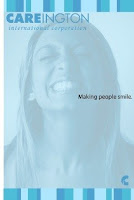 Making People Smile. What a great tag line, and what a great way to view the world as we enter into a brand new year. Wow! Can you believe that another year has passed, and we are staring down the barrel at a brand new year--2008? Where has all the time gone? As each new year comes into view during the end of each Holiday Season, we look ahead for what benefits may be available for the New Year. We also look over the past year to see what successes we had and what failures we endured.
Making People Smile. What a great tag line, and what a great way to view the world as we enter into a brand new year. Wow! Can you believe that another year has passed, and we are staring down the barrel at a brand new year--2008? Where has all the time gone? As each new year comes into view during the end of each Holiday Season, we look ahead for what benefits may be available for the New Year. We also look over the past year to see what successes we had and what failures we endured.Health care has had alot of both. We saw the advent of in-store retail mini-clinics that have taken off with increasing popularity. Most all pharmacy chains, big-box retailers like Wal-Mart and Target, and even some grocery chains have elected to partner with the companies that provide these services--Minute Clinic is an example of one of these clinics. MinuteClinic, which was co-founded by a family physician, is the largest of a growing number of retail clinics, are now in CVS, Targets, Wal-Marts and many other high-traffic retail outlets in metropolitan areas around the country. Patients with acute illnesses can enter these retail clinics without an appointment to see a nurse practitioner or a physician assistant, be diagnosed in a matter of minutes, and head back out the door, stopping by the in-store pharmacy to fill a prescription if needed. If the problem requires a physician, patients are referred to their primary care physicians. If they do not have one, the nurse practitioner refers them to one off the clinic's referral list.
While these clinics lack the personal nature of seeing a family physician who knows your complete medical history, their appeal is their convenience and affordability. The clinics are usually open in the evening and on weekends, and their prices are relatively low - and posted on menu-type boards for all to see.
With other medical news--several pronounced trends: promoting clinical Information Technology being pushed by the government; and the technology of personal health record is being expanded. Additionally, transparency of costs in health care is getting much more attention now as Consumer Directed Health Care is making more headway, especially in the employer market. HSAs are getting much more traction as individuals realize their value as not only a way to save money in the health care space, but also as a great tool for investing for the future. Millions of Americans will sign up for that type of plan this year, and an HSA is a very good tool to save money on out of pocket health care costs when combined with a high deductible health plan. More of those will be sold in 2008 as consumers wake up to the realization that they need to take charge of personal health care decisions.
New trends in health care will continue to develop, and our job as consumers is to make sure that they make sense, are affordable, and have enough available information to make informed and intelligent decisions on personal health matters. Looking ahead in 2008 will be a critical job that every American will need to do in order to save money and maintain a healthy lifestyle.
Until next time. Let me know what you think.





